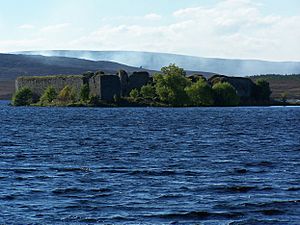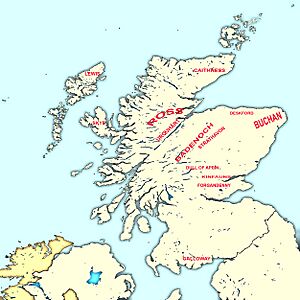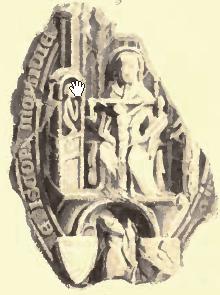Alexander Stewart, Earl of Buchan facts for kids
Quick facts for kids Alexander Stewart |
|
|---|---|
| Earl of Buchan Lord of Badenoch |
|
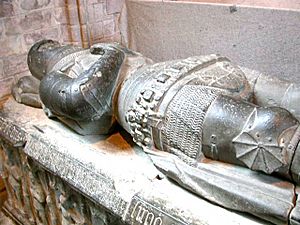
Tomb of Alexander Stewart, Earl of Buchan at Dunkeld Cathedral, where he is buried.
|
|
| Reign | 1382–1394 |
| Born | c. 1343 |
| Died | July 1394 |
| Spouse | Euphemia of Ross |
| Issue | Alexander Stewart |
| House | Stewart |
| Father | Robert II of Scotland |
| Mother | Elizabeth Mure |
Alexander Stewart, Earl of Buchan (also known as Alasdair Mór mac an Rígh), was a powerful Scottish lord. He was born around 1343 and died in July 1394. Alexander was the third son of King Robert II of Scotland. He was known by a scary nickname: the Wolf of Badenoch. This name came from his reputation for being cruel and taking things by force.
Alexander married Euphemia I, Countess of Ross, but they did not have children together. However, he had a large family with Mairead inghean Eachainn. For a time, Alexander was a royal judge in Scotland, but he wasn't very good at it. He controlled huge areas in northern Scotland. Later, he lost much of this land. He is most remembered for destroying the town of Elgin and its beautiful cathedral.
Contents
How Alexander Gained Power
Alexander was first mentioned in official papers in 1370. He promised to protect the Bishop of Moray and his lands in Badenoch. Alexander's father, Robert, had gained control of Badenoch.
Robert had a difficult relationship with his uncle, King David II of Scotland. In 1368, Robert and Alexander were even put in prison. This might have been because their followers were causing trouble. When his father became King Robert II in 1371, Alexander was officially made Lord of Badenoch.
Alexander kept control of Badenoch even when other lands around him changed hands. He also rented lands from his younger half-brother. In 1371, he gained control of the Barony of Strathavon, which was next to his Badenoch lands.
In 1372, Alexander became the King's representative for lands north and west of Inverness. He also gained lands in Aberdeenshire and north Perthshire. This meant Alexander had royal power from north Perthshire all the way to the Pentland Firth.
Alexander greatly increased his land when he married Euphemia, Countess of Ross, in 1382. Through this marriage, he became the Earl of Ross. This gave him control of the Ross lands during his lifetime. He also shared ownership of other lands with his wife, including Lewis and Skye. Because he now controlled a large part of the former Earldom of Buchan, King Robert gave him the title of Earl of Buchan.
Alexander ruled these lands with his own private army. This made other landowners, including the Bishop of Moray, very unhappy.
Conflicts with the Church
For a long time, the bishops in Moray had a lot of independence. But this changed when King Robert I of Scotland gave the Earldom of Moray to his nephew. The Earldom later returned to the crown and was empty for 26 years.
In 1365, Bishop Bur convinced King David II that his church lands should be governed separately. When Bishop Bur made a protection agreement with Alexander in 1370, he made sure Alexander had no power over his church lands or people.
However, when Alexander officially became Lord of Badenoch in 1371, it seemed he would have power over church lands. But Bishop Bur likely protested. The official record of the grant to Alexander does not mention him having special authority over church lands.
Alexander continued to put pressure on the church. His private army often caused problems on church lands. This made the lands less valuable for the church. Historians believe this might be why Bishop Bur gave up some church estates in 1382. The bishops couldn't ask the usual authorities for help because Alexander himself was in charge. So, they had to ask the King directly.
Losing His Influence
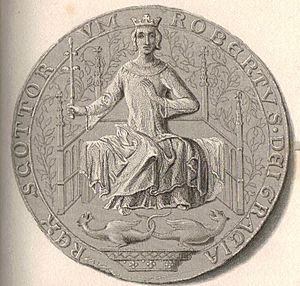
King Robert II's reputation suffered because he supported Alexander's harsh methods. So, in 1384, King Robert's son, John, the Earl of Carrick, took control of the government. One of his main goals was to stop the lawlessness in the north.
Under Carrick's leadership, Alexander started losing some of his power. Other lords began to reclaim lands Alexander had been controlling. In 1385, Alexander's own brother claimed Alexander was holding some lands illegally. The Earl of Moray also demanded that some of Alexander's men be punished for killing his men.
Despite these challenges, Alexander still managed to gain more land. He kept control of Urquhart and gained lands at Loch Ness. He also became a royal judge for areas north of the Forth River.
However, Carrick's leadership didn't stop Alexander's behavior. So, in 1388, King Robert's second son, Robert, Earl of Fife, became the ruler of Scotland. Fife quickly removed Alexander from his important positions. Fife was very strict with Alexander, who had been called "useless to the community."
Alexander had left his wife, Euphemia, and was living with Mairead inghean Eachainn, with whom he had several children. The Church stepped in. In 1389, two bishops ordered Alexander to return to his wife. Alexander agreed but didn't keep his promise. Fife encouraged Euphemia to get a divorce. In 1392, her marriage to Alexander was officially ended by the Church. After this, Alexander lost all claims to Euphemia's lands.
The Burning of Elgin
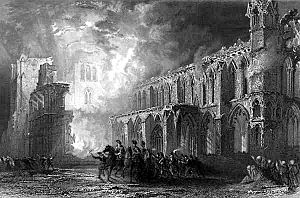
King Robert II died in 1390. His son John became King Robert III. The Earl of Fife remained in charge of Scotland. Alexander had hoped things would change in his favor, but they didn't.
Bishop Bur, who had been in conflict with Alexander, found protection from another powerful lord. These events, along with other lords being away from Moray, gave Alexander a chance for revenge. In May 1390, he destroyed the town of Forres. Then, in June, he burned Elgin and its cathedral.
Alexander completely destroyed the church buildings in Elgin. Besides the cathedral, he burned the Greyfriars monastery, St Giles parish church, and the Hospital of Maison Dieu. Both the Church and the government now stood against him. Alexander was excommunicated by Bishop Bur. He had to appear in Perth before the King and other important people to ask for forgiveness. He was eventually forgiven.
Alexander's attack on Moray was meant to free himself from Fife's control, but it didn't work. He lost his Lordship of Urquhart in 1392. He also lost his claim to the Ross lands after his divorce.
Fife's power lessened in the mid-1390s, while the King's power grew. Alexander seemed to stop his violent actions, but his sons continued. Some of Alexander's sons were even imprisoned in Stirling Castle.
Alexander is mentioned again in 1398, being ordered to give up a castle. He seems to have left the north in his later years. However, most sources say he died in July 1394. This makes later mentions confusing.
Alexander gained huge amounts of land in the north but lost much of it during his lifetime. He also lost his royal appointments. He was not good at keeping law and order. This, along with losing his lands, showed he was not an effective ruler.
Alexander's Death and Legacy
Alexander Stewart is buried in Dunkeld Cathedral. His tomb is very impressive, with a statue of him in armor. It is one of the few royal monuments from the Middle Ages that still exists in Scotland.
There is a famous legend about the "Wolf of Badenoch's" death. It says he died after playing a game of chess with the Devil. The legend tells that a tall man in black visited Alexander at Ruthven Castle. They played chess all night. A storm began when the stranger called "Check" and "Check Mate." The next morning, Alexander was found dead in the castle hall. His men were also found dead outside the castle walls.
His Children and Family
Alexander Stewart had several children with Mariota Mackay. She was the daughter of Iye Mackay, a chief from Strathnaver. Their children included:
- Alexander Stewart, Earl of Mar
- James Stewart, of Fortingall & Garth
- Duncan Stewart
- Sir Andrew Stewart, of Strathaven
- Robert Stewart, of Athol
- Margaret Stewart
- Walter Stewart
Historians believe that Mariota Mackay's family connections explain why Alexander was friends with Farquhar Mackay. Farquhar was Mariota's brother and a doctor to King Robert II. It might also explain why some of the Mackay clan supported Alexander in a raid in 1391. Later, it could be why Angus Du Mackay supported Alexander Stewart, the Earl of Mar (Alexander's son), in a battle in 1411. This is because Mackay and the Earl of Mar would have been cousins.
See Also
 | Valerie Thomas |
 | Frederick McKinley Jones |
 | George Edward Alcorn Jr. |
 | Thomas Mensah |


